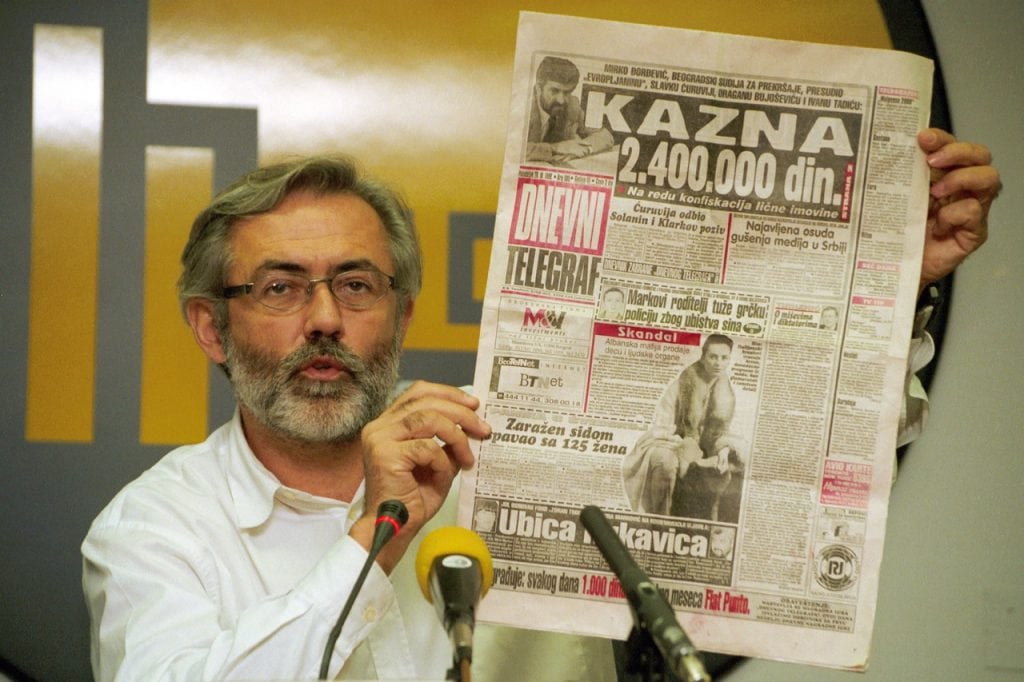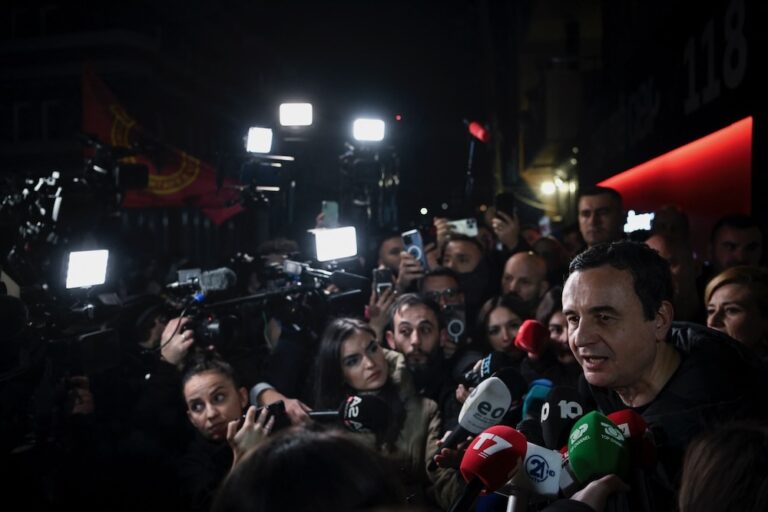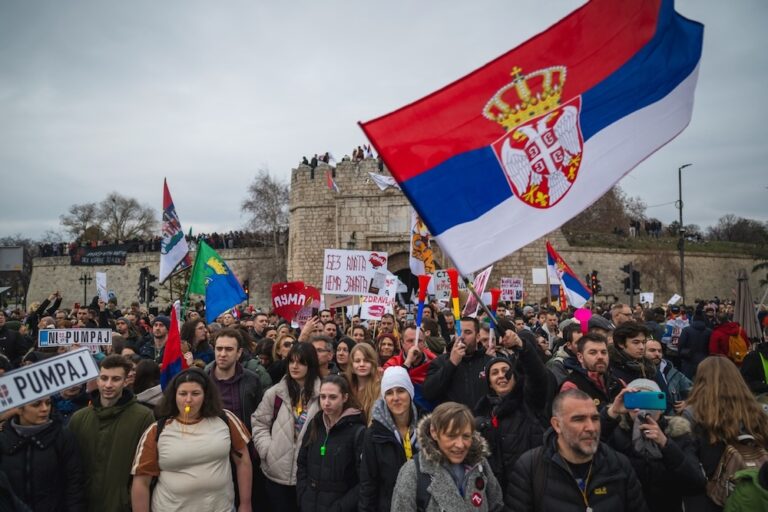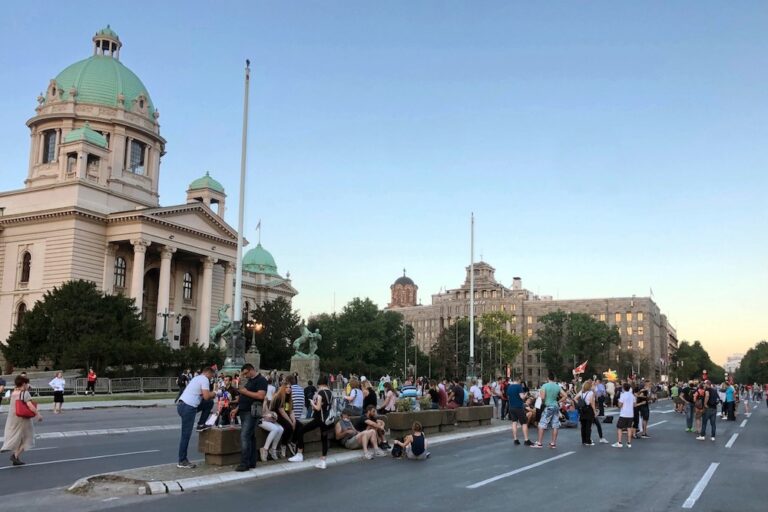Curuvija, who was gunned down by secret police officers during the 1999 NATO bombing campaign against Serbia, had previously been attacked by media allies of Slobodan Milosevic. The man who pulled the trigger was not among the convicted.
This statement was originally published on seenpm.org on 5 April 2019.
A Belgrade court on Friday sentenced four former secret police officers to prison for the 1999 murder of journalist and newspaper publisher Slavko Curuvija but ruled that the man who pulled the trigger was not among them.
The trial of the chief of the Milosevic regime’s State Security Departy (RDB) Radomir Markovic and three of his subordinates took just under four years to complete before the Organized Crime Court with the sentence being handed down just days before the 20th anniversary of the killing, N1 reports.
Curuvija, a former analyst in the Yugoslav federal police ministry turned newspaper publisher, was gunned down in front of his apartment building on April 11, 1999, during the NATO air campaign following fierce attacks from pro-regime media which accused him of taking the side of the Alliance against Serbia. He is also known to have been a confidante of Slobodan Milosevic’s wife Mira Markovic who was alleged to have ordered the killing.
The four defendants were given a total of 100 years in prison. Markovic and Belgrade RDB centre chief Milan Radonjic were sentenced to 30 years each while RDB agents Ratko Romic and Miroslav Kurak got 20 years each. The court ruled that Markovic ordered Radonjic to organize the killing and that Romic and Kurak were ordered to commit it but that the person who fired the gun that killed Curuvija had not been identified during the trial, N1 reports.
Kurak was sentenced in absentia and Markovic is already serving a 40-year sentence for the murder of opposition activists and the abduction and murder of former Serbian President Ivan Stambolic.
The prosecution had requested the maximum sentences of 40 years for all four defendants while defence lawyers argued that they should be freed because their guilt had not been proven.
Curuvija published the Dnevni Telegraf daily newspaper and Evropljanin weekly magazine, both of which were fined under the Law on Information for critical stories about the Milosevic regime.
Mixed Reactions: Satisfaction with verdict and demands for masterminds to be identified
Reactions to the court ruling were not too different among political parties, journalists’ associations, the Slavko Curuvija foundation and Curuvija’s family, with all of them expressing varying degrees of satisfaction.
The Foundation said the verdict confirms clearly and unequivocally that the murder was organized by the government through the State Security Department but expressed disappointment that the court failed to hand down the maximum sentences. It added that the ruling would help society deal with politically motivated crimes and face what it said is the disastrous heritage of the Milosevic regime.
President Aleksandar Vucic expressed great satisfaction that the trial had been brought to a conclusion, saying that a very important message had been sent. “A message that no one has the right to kill anyone, in any way for any reason even if they believe it is a matter of state,” he said.
In an interview with N1, Curuvija’s daughter said those who she believed were responsible were the then regime and the then Minister of Information, current Serbia’s President Aleksandar Vucic.
Asked about whether the justice was served entirely when it wasn’t confirmed who ordered the kill and who pulled the trigger 14 times, the daughter, Jelena Curuvija, said: “In essence, not.” She added she and her family would “never be satisfied since the masterminds, the people we think ordered it, have never been publicly named.”
Branka Prpa, Curuvija’s partner at the time of murder, asked “for how long will we only condemn Rade Markovic and not those who ordered him to do that?” According to her statement for Radio Free Europe, Serbian president Aleksandar Vučić has not been called a single time during investigation by the police, investigating judge or prosecutor so as to find out what he knows about the murder as the then Minister of Information.
The opposition Movement of Free Citizens (PSG) said that justice had been only partially served. According to the PSG, the sentence handed down to the state security chief and his associates is a sentence against the Milosevic regime which was characterized by political murders and the persecution of journalists. A statement added that “the current regime is no different in terms of the people representing it and the methods it uses”.
The Independent Journalists’ Association of Serbia (NUNS) welcomed the ruling 20 years after the “monstrous crime”, but expressed dissatisfaction that the person who pulled the trigger and the masterminds have not been identified.
NUNS demanded that the murders of Serbian journalists Radislava Dada Vujasinović [murdered in 1994] and Milan Pantić [murdered in 2001], and other crimes against journalists, be resolved. “The state would thus show indisputable dedication to journalists’ and media freedoms”, NUNS statement reads.
The Association of Journalists of Serbia (UNS) called state bodies to find the person who pulled the trigger killing Curuvija and added that it expects the verdict to be confirmed on appeal. It said the ruling is significant because it marks an end to impunity for crimes against journalists.
The OSCE Representative on Freedom of the Media, Harlem Désir, welcomed a Serbian court ruling.
“This long-awaited ruling is significant, as it shows that there can be no impunity even for crimes committed 20 years ago,” an OSCE statement quoted Désir as saying.
Reporters Without Borders (RSF) said that they hailed “the ‘historic’ sentences of 20 to 30 years in prison that four men received” and urged the authorities “to pursue the investigation in order to identify and punish the person who ordered the murder.”



